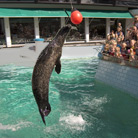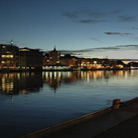 |
 |
|||
 |
 |
|||
 |
 |
|||
|
|
Call for papersTransactions and interactions - the flow of goods, services, and informationImports and exports, wholesale and retail - what research suits more a maritime city such as Bergen? Since the industrial revolution the flow of exported/imported goods grew faster than production of goods. Foreign direct investment (FDI) grew even faster than trade, while services overtook FDI. The headline of our congress addresses the most dynamic part of the economy. Also inside enterprise: During the 19th century on-lookers were amazed how much faster the amount of white-collar workers accelerated compared to blue-collar workers. Today even many industrial firms employ more of the latter than of the former. The flow of information, control, advice and monitoring became ever more important. This includes also external services for instance in finance, business consultants, lawyers, and others offering arbitration or technical advice. The flow of information is not only essential for the stock exchange, but for instance for shipping, hospitals, retail-trade, fire-brigades, or taxation. It includes ideas, all kinds of networks, intangible assets (e.g. trade marks) their development and their protection. Bergen as a maritime city is the right place to deal with such transactions: In medieval times it became Norway’s largest city because of its trade in fish and grain. Today just one station outside the town pumps about one percent of the whole world’s gas into export-pipelines. The Hanseatic League, once representing the backbone of the city’s trade, became so powerful that it could decisively influence the policy; a fact, which reminds us of political intervention by transnational enterprise in more recent years. We call for papers on all types of flows of goods, services, and information, including interaction between politics and economics. Well designed suggestions on other fields of research are also welcome. The following list is designed just to generate inspiration for single presentations as well as for sessions: One of the most visible issues concerning the congress is trade in all its facets: international, national, regional, local, and illegal trade. Trade is carried out by means of transport, on sea, air, road, railroad, rivers & canals, animals and even man; making use of ports, airports, distribution centers, ware-houses, using the most different techniques from face-to-face conversation to GPS (Global Positioning System). Up to the 1980s finances more or less followed trade. However, since then financial activities have emancipated themselves from the “real economy” and trade in financial goods has outgrown trade in goods many times. We consequently need contributions dealing with this sector, such as financial centers, insurance, special financial institutions, accounting, stock exchanges for goods, derivates and so on. Transfer and interaction is a topic addressing technology also. The spread of technology, its often incremental improvement, R&D, both internal and external of enterprise, on a national and on an international level, its accelerations and retardations as well as its barriers and interdictions are topics at the congress. We can think of networks such as internal IT-solutions of organizations up to the World Wide Web, of physical networks made of pipelines, electric grids, telecommunication, rail and road as well as line- and tramp-shipping, covering the whole world or small parts of it. There are personal networks of information and official networks, such as the European Round Table of Industrialists. There are local, national and European networks of labour unions, influencing, for instance by European Works Councils, decision-making in enterprise. Disposal and ownership of information became a key to success in business and institutions. We can imagine contributions concerning its internal flow in organizations, by news-agencies, property rights on pictures, films, broadcasting, TV, telecommunication, advertising, trade marks, market research, trade (and insider-trade), or the general principal-owner relationship and many more. A centerpiece for success or failure is security. Thus, contributions concerning law, (national and international), law-enforcement (state and private), policing as business, conventions, arbitration, insurance and so on are welcome. Last not least: We will again have our competition on the best PhD-thesis in Business History for the EBHA-prize – trust yourself and send your thesis! ProposalsThose interested in presenting a paper should prepare a one-page abstract. Proposals for panels should contain the abstracts of the individual papers as well as a short summary explaining the rationale of putting these together in one panel. Suggestions for chairs and discussants of the panel will also be welcomed. Please e-mail your abstracts or panel proposals to ebha2008@uib.no. The new deadline is February 15, 2008.
|
|
|



